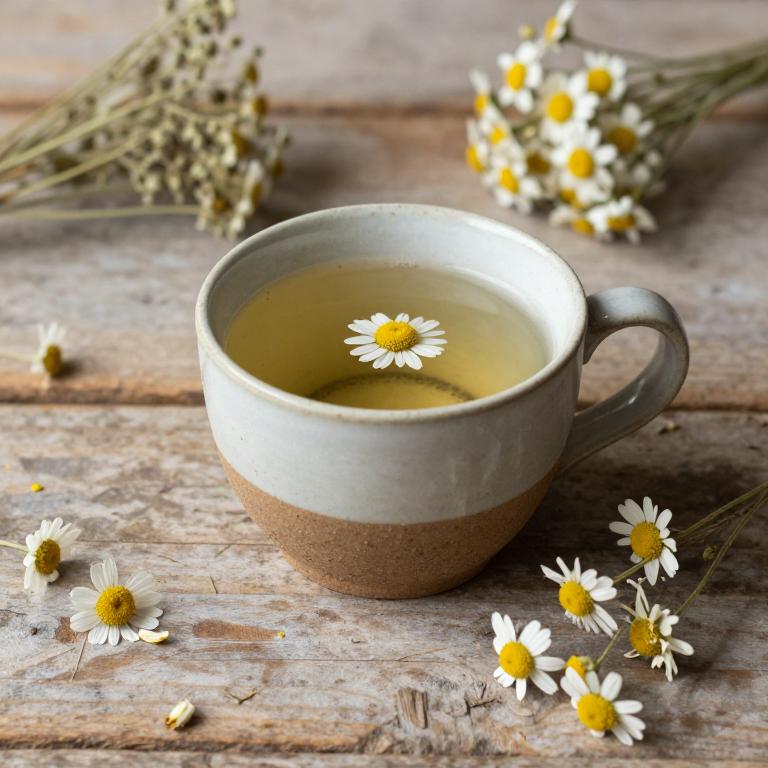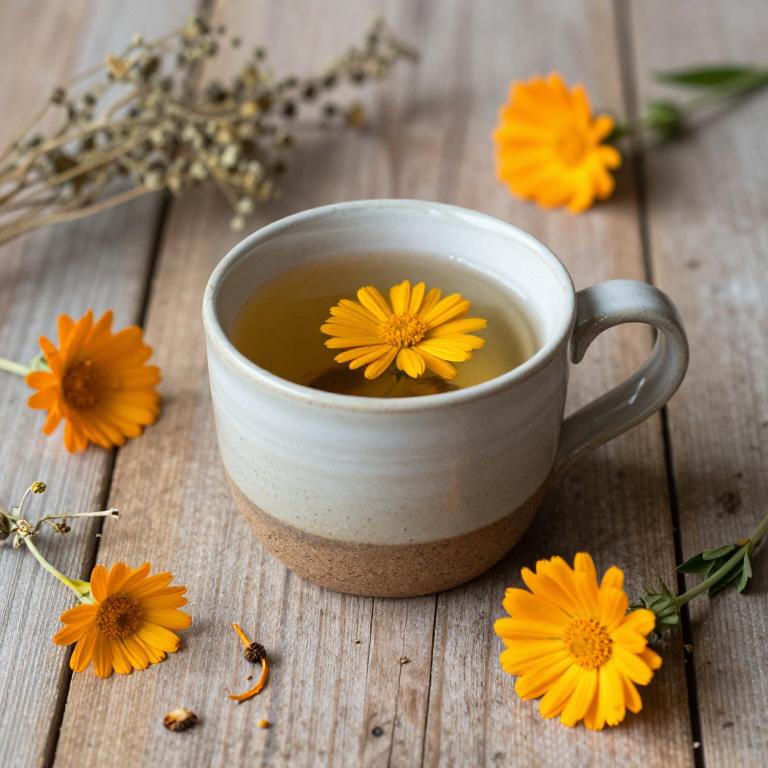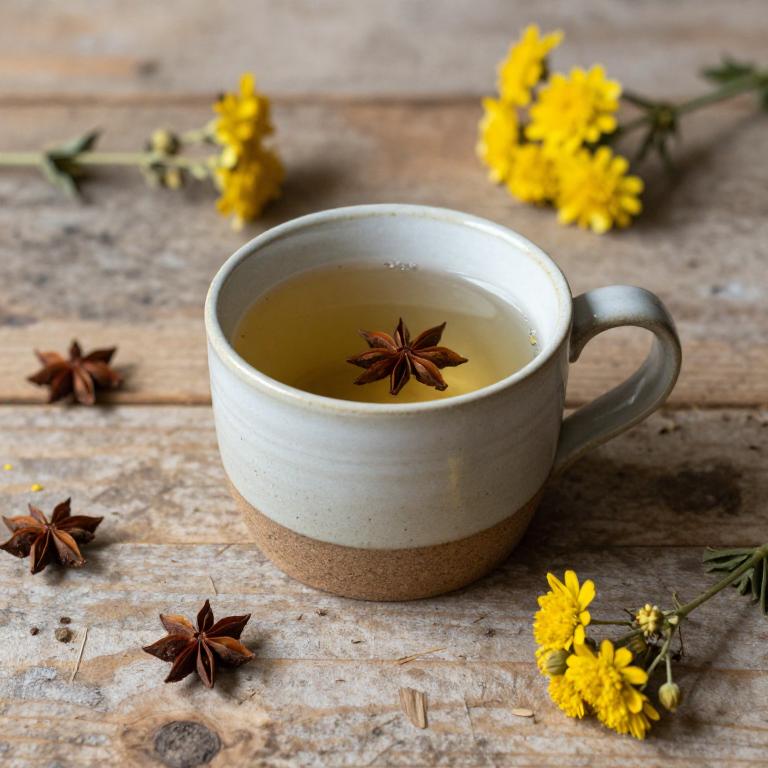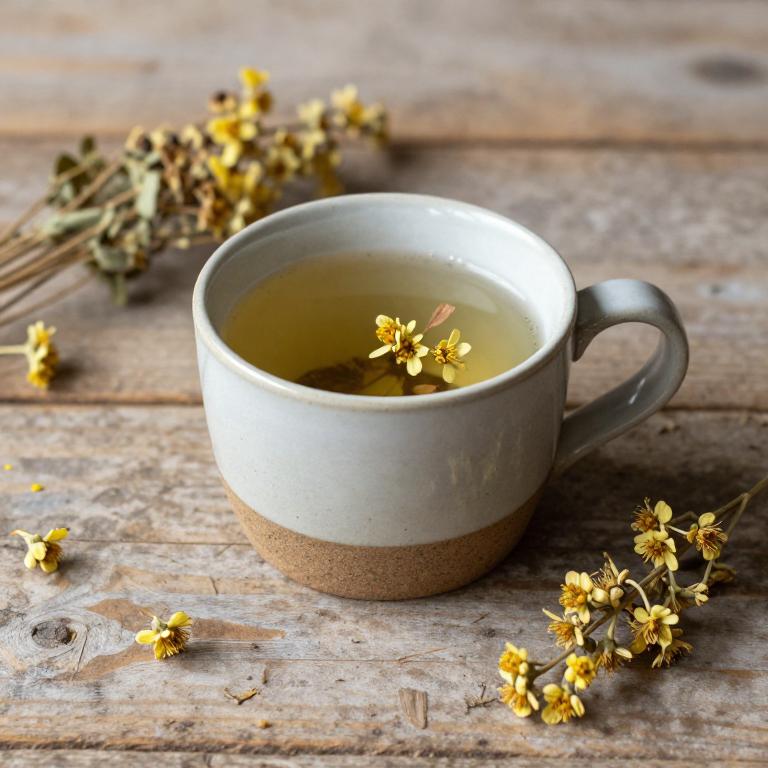10 Best Herbal Teas For Vaginitis

Herbal teas can be a natural and soothing option for managing symptoms of vaginitis, as certain herbs possess antimicrobial and anti-inflammatory properties.
Chamomile, calendula, and lavender are commonly used in herbal teas for their ability to reduce irritation and promote healing of the vaginal area. These teas can be applied topically as a sitz bath or used internally with caution, though it's important to consult a healthcare provider before using them for internal consumption. While herbal remedies may offer relief, they should not replace professional medical advice, especially if symptoms persist or worsen.
Overall, herbal teas can complement conventional treatments but should be used as part of a holistic approach to vaginal health.
Table of Contents
- 1. German chamomile (Chamomilla recutita)
- 2. St. john's wort (Hypericum perforatum)
- 3. Field horsetail (Equisetum arvense)
- 4. Stinging nettle (Urtica dioica)
- 5. Marigold (Calendula officinalis)
- 6. Dog rose (Rosa canina)
- 7. Anise (Pimpinella anisum)
- 8. Rosemary (Rosmarinus officinalis)
- 9. English lavender (Lavandula angustifolia)
- 10. Lemon balm (Melissa officinalis)
1. German chamomile (Chamomilla recutita)

Chamomilla recutita, commonly known as German chamomile, has been traditionally used for its calming and anti-inflammatory properties, making it a popular herbal remedy for vaginitis.
The essential oils in chamomile, particularly bisabolol and chamazulene, possess antimicrobial and antifungal effects that may help alleviate symptoms such as itching, burning, and discharge associated with vaginal infections. When brewed into a tea, chamomile can be used as a soothing sitz bath or applied topically to the affected area to provide relief. However, it is important to note that while chamomile may offer symptomatic relief, it should not replace medical treatment for underlying infections.
Always consult a healthcare provider before using chamomile or any herbal remedy for vaginitis to ensure safety and appropriateness for individual health conditions.
2. St. john's wort (Hypericum perforatum)

Hypericum perforatum, commonly known as St. John's Wort, is a herbal plant that has been traditionally used for its potential therapeutic properties.
While it is well-known for its use in treating mild depression, it has also been explored for its antimicrobial and anti-inflammatory effects, which may be beneficial for conditions like vaginitis. Some studies suggest that hypericum perforatum may help reduce symptoms of bacterial vaginosis due to its ability to inhibit the growth of harmful bacteria. However, it is important to note that there is limited clinical evidence supporting its efficacy for vaginitis specifically, and it should not replace conventional medical treatments.
As with any herbal remedy, it is advisable to consult a healthcare provider before use, especially since it can interact with other medications.
3. Field horsetail (Equisetum arvense)

Equisetum arvense, commonly known as field horsetail, is a herb that has been traditionally used for its high concentration of silica and other beneficial compounds.
While it is not a primary treatment for vaginitis, some herbal teas made from Equisetum arvense may support vaginal health by promoting tissue strength and reducing inflammation. However, it is important to note that there is limited scientific evidence supporting its effectiveness for vaginal infections, and it should not replace conventional medical treatments. Due to its potential diuretic properties and possible interactions with other medications, it is advisable to consult a healthcare provider before using field horsetail for vaginitis.
As with any herbal remedy, proper preparation and dosage are essential to ensure safety and efficacy.
4. Stinging nettle (Urtica dioica)

Urtica dioica, commonly known as stinging nettle, has been explored as a natural remedy for vaginitis due to its anti-inflammatory and antimicrobial properties.
When prepared as a herbal tea, it may help reduce irritation and inflammation associated with vaginal infections by soothing the mucous membranes. The tea is typically made by steeping dried nettle leaves in hot water, and it can be consumed internally or used as a sitz bath for localized relief. However, it is important to consult with a healthcare provider before using stinging nettle tea, as it may interact with certain medications or conditions.
While some anecdotal evidence supports its use, more scientific research is needed to fully understand its efficacy and safety for treating vaginitis.
5. Marigold (Calendula officinalis)

Calendula officinalis, commonly known as pot marigold, has been traditionally used in herbal teas to support vaginal health and alleviate symptoms of vaginitis.
The anti-inflammatory and antimicrobial properties of calendula may help reduce irritation, redness, and infection associated with vaginal inflammation. When brewed into a soothing tea, calendula can be applied externally as a douche or used in sitz baths to promote healing and comfort. However, it is important to consult a healthcare provider before using calendula for vaginitis, especially if there is an underlying infection or sensitivity to plants in the Asteraceae family.
While calendula may offer natural relief, it should not replace professional medical treatment for persistent or severe cases of vaginitis.
6. Dog rose (Rosa canina)

Rosa canina, also known as rosehip, is a herbal remedy that has been traditionally used for its anti-inflammatory and antioxidant properties.
When prepared as a herbal tea, it may help alleviate symptoms of vaginitis by reducing inflammation and supporting the body's natural healing processes. The tea is typically made by steeping dried rosehips in hot water, and it is often consumed as a soothing drink. While it is generally considered safe for most individuals, it is advisable to consult a healthcare provider before using it for medical conditions like vaginitis.
Some studies suggest that the high vitamin C content in rosehip may contribute to its potential benefits for vaginal health.
7. Anise (Pimpinella anisum)

Pimpinella anisum, commonly known as anise, is a herbal remedy that has been traditionally used for its potential benefits in treating vaginitis.
The essential oils in anise, particularly anethol, possess antimicrobial and anti-inflammatory properties that may help alleviate symptoms such as itching, odor, and irritation associated with vaginal infections. When brewed into a herbal tea, anise can be consumed internally to support overall reproductive health and balance the vaginal microbiome. However, it is important to consult a healthcare provider before using anise tea, especially if there are underlying medical conditions or if symptoms persist.
While anise may offer some relief, it should not replace professional medical treatment for vaginitis.
8. Rosemary (Rosmarinus officinalis)

Rosmarinus officinalis, commonly known as rosemary, is an herb that has been traditionally used for its antimicrobial and anti-inflammatory properties, making it a potential natural remedy for vaginitis.
Rosemary herbal teas may help alleviate symptoms such as itching, odor, and discomfort by promoting a balanced vaginal environment. The essential oils in rosemary, particularly cineole and rosmarinic acid, are believed to have antibacterial and antifungal effects that can combat common pathogens associated with vaginal infections. While some studies suggest its benefits, it is important to consult a healthcare provider before using rosemary tea as a treatment, as it may not be suitable for everyone.
Overall, rosemary herbal tea can be a complementary approach to managing vaginitis, but it should not replace professional medical advice or treatment.
9. English lavender (Lavandula angustifolia)

Lavandula angustifolia, commonly known as English lavender, has been traditionally used in herbal teas to support vaginal health and alleviate symptoms of vaginitis.
The essential oils in lavender possess antimicrobial and anti-inflammatory properties that may help combat bacterial or fungal infections contributing to vaginitis. When brewed into a tea, lavender can soothe irritation and reduce discomfort associated with inflammation of the vaginal area. However, it is important to consult a healthcare provider before using lavender tea, as it may interact with certain medications or conditions.
While lavender tea can be a complementary remedy, it should not replace conventional medical treatments for vaginitis.
10. Lemon balm (Melissa officinalis)

Melissa officinalis, commonly known as lemon balm, is a herbal remedy that has been traditionally used for its calming and antiseptic properties.
When brewed into a tea, it may help alleviate symptoms of vaginitis by reducing inflammation and soothing irritation in the vaginal area. The essential oils in lemon balm possess antimicrobial effects that may help combat certain bacterial or fungal infections contributing to vaginitis. However, it is important to consult a healthcare provider before using lemon balm tea, as it may interact with other medications or conditions.
While it can be a supportive complement to conventional treatments, it should not replace medical advice or prescribed therapies for persistent or severe cases of vaginitis.